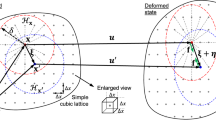Abstract
The essential work of fracture (EWF) fails for the toughness determination of polymers showing a decrease of the specific work of fracture, as a function of the specimen ligament. This type of behaviour was observed for poly(butylene terephthalate) (PBT) and its core/shell rubber modified blend (PBT/CS). It was found that this peculiar behaviour is due to a ductile-to-brittle transition (DBT) in the crack propagation phase. Experimental data were corrected by considering only the ductile-fractured specimen area. When a non linear function of the type y=a+bx−1 was applied for the corrected specific work of fracture and ligament data, the specific essential work of fracture (we) could be deduced. The latter being an inherent material toughness parameter was compared with the critical J-integral (Jc) values and a good correlation was found between them.
Similar content being viewed by others
Author information
Authors and Affiliations
Additional information
Received: 1 February 1999/Revised version: 25 March 1999/Accepted: 31 March 1999
Rights and permissions
About this article
Cite this article
Mouzakis, D., Karger-Kocsis, J. Essential work of fracture: application for polymers showing ductile-to-brittle transition during fracture. Polymer Bulletin 42, 473–480 (1999). https://doi.org/10.1007/s002890050491
Issue Date:
DOI: https://doi.org/10.1007/s002890050491




